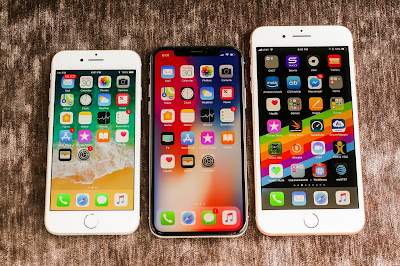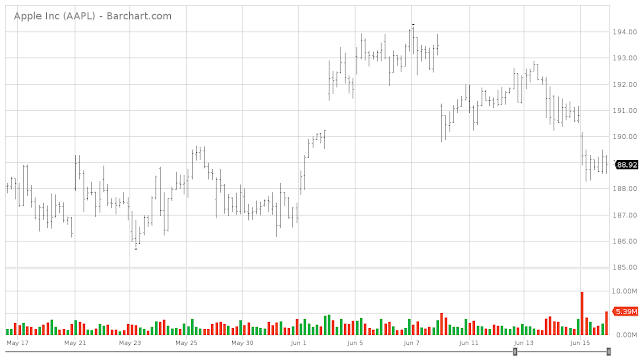Apple Believes Cheaper Iphones Will Be More Popular

The news out on Friday that Apple (AAPL) will focus more on the cheaper LCD (liquid-crystal displays) than the more expensive OLED (organic light-emitting diode) screens in its fall rollout of phones illustrates that even Apple consumers have finally balked at $1,000 phones. The iPhone X release this past year was the first Apple iPhone with the OLED screens, and it obviously hasn't sold well, or Apple wouldn't be offering the majority of their product mix this fall with the cheaper LCD screens.
However, this points to another problem for Apple, Samsung (SSNLF) Galaxy phones have had the better OLED screens for over 7 years, and with a much more competitive price even at the high end of the market. In short, Apple cannot make an OLED screen phone for the $700- $800 max threshold that consumers seem willing to pay for a phone, even a high end smartphone.
This is the problem with Apple products in general, when you compare Apple to the competition, even at the high end for laptops, smartphones or tablets you pay much more for less product specs. It isn't even style differences anymore as high end lightweight laptops have all morphed into the same sleek design architecture, but you will pay $1000 more for an Apple laptop with far less specs than the top of the line laptops on the market. Apple has marketed themselves as the high end status brand in the market, but the flop of the iPhone X illustrates that even Apple fans have their limits to brand versus price considerations. 1,000 dollars for a smartphone has proven to be too much for consumers, regardless of the logo on the device.
We have seen this economics lesson play out at the pump with gasoline prices, as consumers seem to have real problems with $4 a gallon gasoline prices, which starts changing behavior in the market from driving patterns to automobile purchases. Thus, it appears that $1,000 for smartphones is the equivalent to $4 a gallon gas prices, and weakening demand starts to gain traction in the market.
The real question for Apple is why they cannot make an OLED smartphone for the same price as Samsung at the high end? It just finally illustrates once and for all that Apple products are overpriced, and Apple iPhones are inferior products to Samsung smartphones at the high end. Samsung makes a better quality smartphone with better product specs at the high end, and does it for a cheaper price.
There is also talk that Apple will offer some iPhones priced in the $550 and $650 range going forward, and indicates what we have been saying all along, that the next strategic advantage in the ever maturing smartphone market will be price! As a technology becomes mature, fully commoditized, with little product differentiation, the price wars begin, and prices and margins start coming down in a definable category trend. The next front for market share wars at the high end will be price, who can offer the same commoditized smartphone features at the best price!
The other thing I noticed in the Apple news on Friday is that since the fall models will not be a major new product refresh, Apple is offering a bunch of slightly different, cluster of incremental iPhone upgrades that is highly cannibalizing and confusing for the iPhone brand in general. This strategy has been trending for apple with the last 3 generations or so of the iPhone, and seems to finally be hitting the ridiculous stage. This seems a little like a company in desperation mode to try and squeeze a little more juice from the dried up marketing lemon, because they really don't have much new to offer on the creative and engineering side of the equation for the next iPhone upgrade!

This again points to the commoditization and mature market nature for smartphones in general, and why consumers don't need to go and upgrade for the next smartphone every year, two years, or even three years. Consumers will hold onto their smartphones longer as the new upgrades offer very little premium upgrade value over existing smartphones given the price factor for a new high end smartphone of $800-$1,000. If you want to sell the equivalent number of smartphones as in the past Apple, you better start lowering the price. Otherwise, Apple can keep the same high prices, and just sell much fewer phones going forward.
Remember all the hype by analysts and investors regarding this new anniversary release of the iPhone, going to be a real game changer, frankly it has been underwhelming to say the least. And it illustrates that even Apple consumers are price sensitive in the end!




Thanks for your advise.
Looks like people are finally starting to have enough of apple's ridiculously high prices. Could spell trouble for #Apple stock. $AAPL
Time will tell if this works for #Apple. But there is simply no reason to drop $1k on a cellphone. It seems to me that Apple has become out of touch with the common people or greatly over estimated it's customers' loyalty.
@[Joe Black](user:4869), personally, I think you are right on both counts. But I'll take it a step further. I think #Apple did assume they'd get their most loyal, die-hard fans to pony up $1,000 big ones for their newest #iphoneX. Which is plain wrong. This should have been targeted to the luxyury market. Not to the masses who can not afford this, or should have really invested the $1k elsewhere.
You are being too harsh. Apple wasn't irresponsible, nor did it have any moral responsibility here to anyone other than $AAPL shareholders. It didn't make anyone buy this phone who couldn't afford it. People are free to do with their money what they wish. Apple took a gamble on this phone and lost and is adjusting their strategy appropriately. That is the very definition of corporate responsibility.